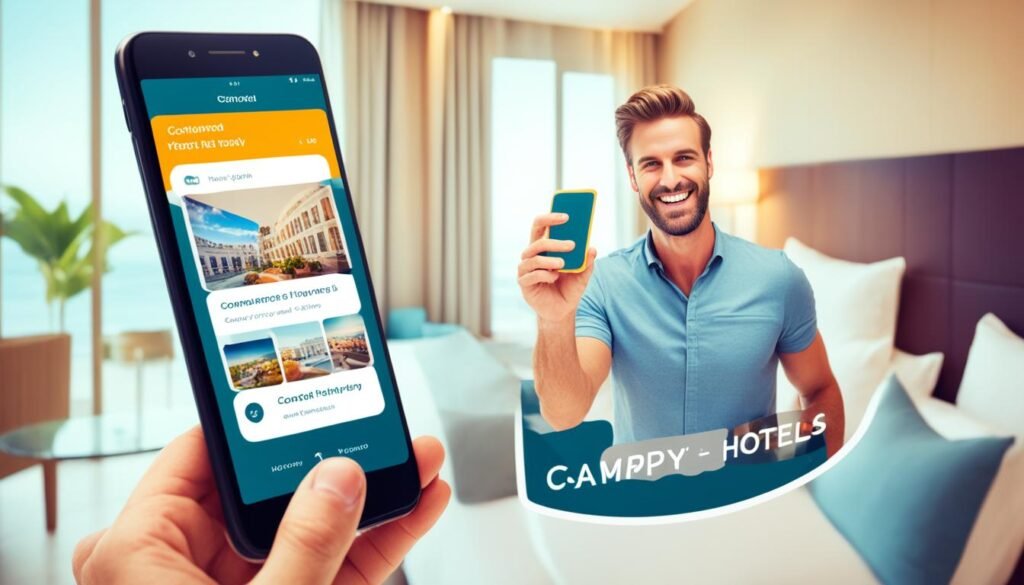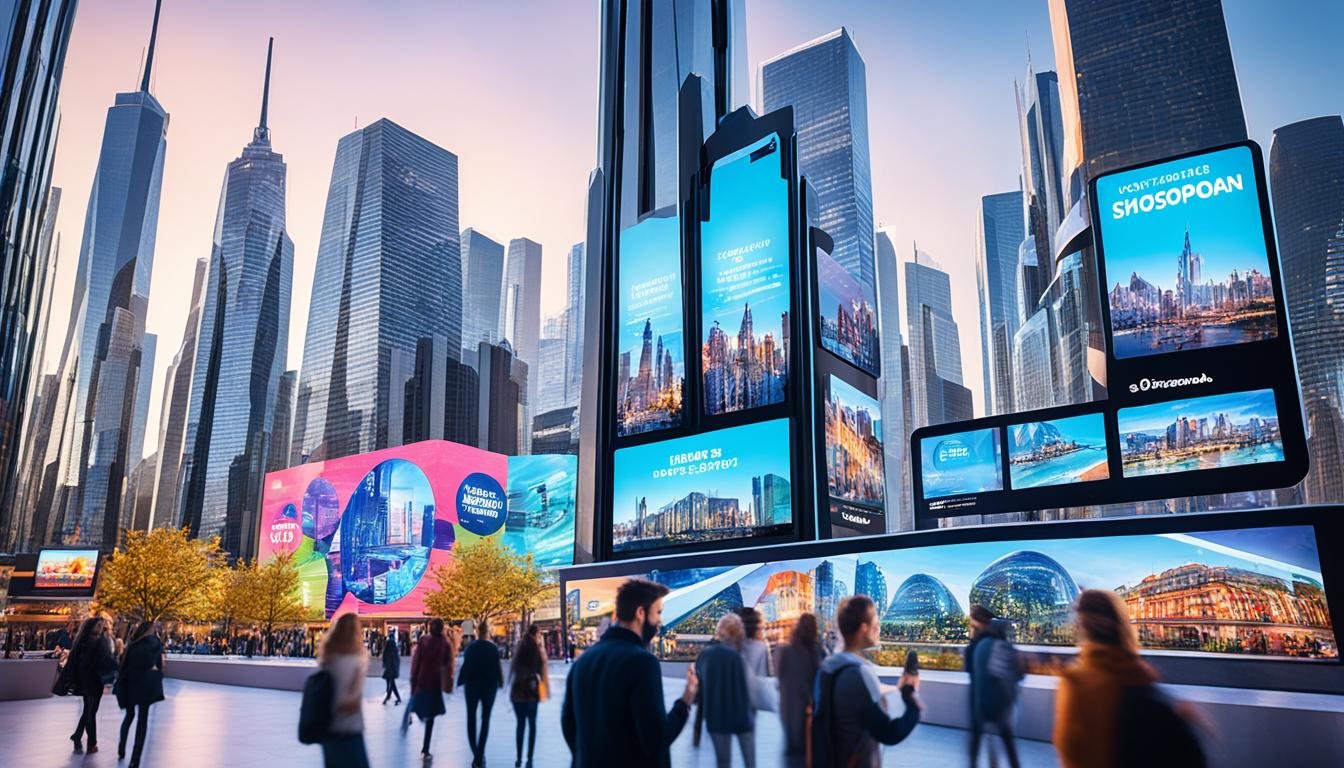Effective Hospitality Industry Marketing Strategies
Imagine this: You’re at your beloved coffee shop enjoying a perfect latte. Across you, two friends discuss vacation plans. One thinks they found their dream hotel. The other suggests a different one they found on Instagram. You get interested and decide to look it up.
This scenario shows how strong marketing in hospitality is today. With social media all around us and endless choices, hotels must be quick to catch people’s eyes.
For hotels, using digital marketing can completely change the game. It allows them to interact with their guests better, get them to come back more, and boost bookings. By using the latest marketing ideas, hotels can break away from the crowd and draw in guests.
Here, we’ll dive into how you can make your hotel marketing better. We’ll look at using social media, making great content, working with influencers, and doing well in local searches. These tips can help you make the most of your marketing and grow your hotel’s reputation.
Key Takeaways
- Effective marketing strategies are crucial for the success of the hospitality industry.
- Social media platforms provide an opportunity to connect with and engage potential guests.
- Compelling content helps establish brand authority and attracts travelers seeking authentic experiences.
- Collaborating with influencers can amplify your brand’s reach and influence bookings.
- Optimizing for local SEO improves visibility in local search results.
Embrace the Power of Social Media
Social media platforms have changed how businesses talk to customers, even for the hospitality industry. To make your hotel stand out, you must use social media well. With Instagram, Facebook, and Twitter, you can show off your place, talk live with visitors, and make a strong online group.
Social media is great for telling stories through images. Use Instagram to post beautiful images of your hotel. This can attract guests and make them feel connected to your brand.
Sharing happy reviews online can build trust in your hotel. Encourage guests to talk about their good experiences on Facebook and Twitter. This gives future guests confidence to choose your hotel.
Offering special deals on social media is smart. Give something special to your followers, like a discount or special package. This can motivate them to pick your hotel over others.
Responding quickly to comments and messages shows you care. It shows you’re listening and value feedback from guests.
Getting guests to join your online community is vital. Ask them to follow you and share their stories. With an active online presence, you can build a group of fans who love your hotel and tell others about it.
“Social media lets hotels and resorts connect with guests in exciting ways. From great pictures to showing off what visitors say, it’s key for getting your name out and keeping people coming back.”
Key Advantages of Social Media Marketing for Resorts and Hotels
| Advantages | Description |
|---|---|
| Increased Brand Visibility | By using social media, you can reach more people and make your hotel more known to possible guests. |
| Direct Guest Engagement | It offers a way to talk straight to guests, letting you answer questions and build good relationships. |
| Visual Storytelling | On Instagram, you can share your hotel’s unique look to catch the eye of future visitors. |
| Social Proof | Putting up good guest reviews online can make your hotel seem more trustworthy to people looking to stay. |
| Exclusive Promotions | You can share special offers with your social media fans, encouraging them to book directly with you. |
| Creating a Loyal Community | By engaging online, you can make fans of your hotel who will share their love for it with others. |
Create Compelling Content
Using content marketing can help your brand stand out. It lets you share valuable insights, tips, and recommendations with travelers. For example, blog posts, guides, and videos can attract people looking for real experiences.
Making your brand an expert through content can win trust. By sharing engaging content, you become more visible. Plus, you build strong connections with potential guests over time.
Engaging Blog Posts
Blog posts are a great way to market your content. They attract readers by talking about topics they care about. This way, you can become a trusted source and connect with travelers early in their planning stage.
Compelling Videos
Videos are key to digital content today. They let you showcase your place and make unique experiences shine. Videos can tell stories, show off what you offer, and make an emotional bond with viewers. This can inspire them to choose your place.
Influencer Collaboration
Teaming up with influencers who share your values can boost your marketing. They have followers who believe in them, making their words powerful. By working with influencers, you can create content that speaks to their audience and sparks interest in your place.
User-Generated Content
Getting guests to share their stories online is a gem for your brand. It makes your brand more real and trustworthy. Sharing this user content on your site and social media boosts your online presence and connection with guests.
Using content marketing in your brand’s strategy can really pay off. High-quality content can inspire guests to choose your place, resulting in positive business outcomes. It’s all about connecting with your audience in a meaningful way.
Leverage Influencer Collaborations
In today’s digital age, partnering with influencers is a big win for hotels. It lets them reach more people and boosts how well-known the brand is. By teaming up with influencers that match your values, you can use their fans to spread your message. This can lead to more people booking with your hotel.
It’s key to pick influencers who truly like hotels and can speak to their fans in a real way. Their posts should make staying at your hotel sound cool and friendly, not like a sales pitch. This realness helps their fans trust and like what they show about your place.
Work with influencers who fit with your brand’s look and feel. They can make real content about their stay at your hotel.
Influencers have a lot of pull over their followers. The things they recommend or the stories they share can really impact what their fans do. Using influencers smartly can help you get that impact, making your hotel better known and maybe even bringing in more money.
Reaching out to influencers means making it a win for both of you. Give them a stay they’ll always remember, chances to make awesome posts, and keep talking with each other. This sets you both up for a good working relationship.
With the right influencers, your hotel can become a top choice for travelers. This moves you up in the hotel world, even when there’s a lot of competition.
Advantages of Influencer Collaborations in the Hotel Industry
1. Partnerships with influencers get your hotel seen by more eyes.
2. Their real and relatable posts catch the eye of potential visitors.
3. Helps your hotel stand out in a busy market.
4. Boosts trust in your hotel through an influencer’s honest review.
5. Allows for cool and creative ways to show off your hotel.
6. Helps manage your hotel’s image by teaming up with respected influencers.
7. Can lead to more bookings and money as influencers guide their fans to your place.
8. Is often a cheaper way to market than traditional ads.
Optimize for Local SEO
For hotels and other places where people stay, local search engine optimization (SEO) is very important. It helps them get more guests and be seen more online. In the growing hotel business, making your website visible locally is key to attracting more visitors.
To make your website better for local SEO, use these strategies:
- Accurate Business Listings:
Make sure your business details are correct on Google My Business and other local sites. This includes your business name, address, phone number, and website. Having the same information everywhere helps your website seem more trustworthy and rank better in local searches. - Location-Specific Keywords:
Use keywords that mention your location in your website’s content. This means using them in titles, headlines, and descriptions. It helps search engines understand where your business is and connects you better with people in your area. - Location-Based Content:
Share information about your area, like attractions or events, on your website. This can draw in people looking for specific places and things to do. It’s a great way to show what makes your area and property special. - Customer Reviews:
Ask your happy guests to write reviews on Google, TripAdvisor, or Yelp. Positive reviews can influence other potential guests. Always reply to reviews to show you care about your guests’ experiences and to build a good online reputation.
Following these local SEO tips will boost your website’s visibility in local search results. Targeting guests in your area can make your online presence strong. This will help you attract visitors searching for stay options near you.
| Benefits of Local SEO for Hospitality Businesses | Challenges of Local SEO for Hospitality Businesses |
|---|---|
|
|
By using the right local SEO techniques, hotels and similar places can improve their online presence. It helps stand out in the competitive hotel market. Keep updating and checking on your SEO work to always stay ahead.
Personalize the Guest Experience
In the hospitality industry, making guests feel special is key in marketing. Hotels and restaurants get ahead by knowing what each guest likes. This makes visits memorable and leaves a good impression.
They use data to talk to guests in a way that feels just for them. For example, they might say hi using the guest’s name. They also offer surprises that match what the guest enjoys. These things make guests feel like they’re getting special treatment.
Doing all this not only makes the visit better. It also makes guests want to come back. Meeting individual needs builds a connection. It makes guests more likely to tell others how great their stay or meal was.
One smart way to offer personalized service is through data. For instance, hotels may notice that a guest likes to relax. They might then offer a spa session. This responds to what the guest enjoys.
“Guest personalization is not just a trend; it’s become an expectation. By tailoring our offerings to individual preferences, we can create truly exceptional experiences that keep guests coming back.” – Emily Johnson, General Manager of The Grand Hotel
Celebrating guests’ special times is another nice touch. It could be a special setup for an anniversary. Or surprising a guest with a birthday cake. These moments show the guest they’re truly valued.
Last but not least, feedback is crucial in getting personalization right. Hotels and restaurants listen to guests’ thoughts. This helps them get better at making visits perfect. It’s a constant loop of listening and improving.
Personalization stands out in the market. It makes guests remember their experience. By using data to know what guests want, businesses offer the best. This encourages guests to come back. And they tell their friends about the great service too.
Benefits of Guest Personalization:
- Enhanced guest satisfaction and loyalty
- Increased positive word-of-mouth recommendations
- Improved guest retention and repeat bookings
- Competitive edge in the hospitality market
- Opportunity for upselling and cross-selling based on guest preferences
Examples of Guest Personalization:
| Establishment | Personalization Approach |
|---|---|
| The Bayview Resort | Assigning personalized welcome notes and amenities based on guest preferences |
| La Table Restaurant | Creating customized tasting menus for guests with dietary restrictions or preferences |
| The Riverside Hotel | Sending personalized email offers featuring activities of interest to previous guests |
Offer Mobile-Friendly Booking

Today, most people use their phones for everything. This includes booking hotels. So, it’s important for hotels to have a booking experience that works well on phones.
For hotels, getting the website to work smoothly for booking is key. If booking is hard, people might not finish and go elsewhere. This means the hotel loses money.
Make booking on a phone simple. Here’s how:
- Streamline the process: Make booking easy by removing steps that aren’t needed. This keeps guests from getting frustrated or giving up.
- Optimize the layout: Your hotel’s website should look good on all device screens. This makes it easy for guests to find what they need when booking.
- Provide clear information: Be sure to show everything clearly. Things like room types, prices, and what’s included are very important.
- Enable guest reviews: Good reviews help guests trust your hotel. It shows you offer excellent service and a great stay.
- Implement secure payment options: Use trusted payment services to keep guests’ information safe. This makes them feel more comfortable booking online.
Make sure your website is great on phones. This way, you can welcome more guests and get more bookings. Remember, success comes by keeping up with digital trends and meeting guests’ needs.
Example: Mobile-Friendly Booking Process
| Step | Action |
|---|---|
| 1 | Visit the hotel’s website on a mobile device. |
| 2 | Tap on the “Book Now” button. |
| 3 | Select the desired check-in and check-out dates from a mobile-friendly calendar. |
| 4 | Choose the preferred room type and number of guests. |
| 5 | Review the room details, rates, and inclusions before proceeding. |
| 6 | Fill in the required guest information fields. |
| 7 | Select a secure payment method and provide the necessary details. |
| 8 | Review the reservation details one last time before confirming. |
| 9 | Receive a booking confirmation and any additional instructions via email. |
Utilize Email Marketing
Email marketing keeps your restaurant in your guests’ minds. It does this by sending out regular newsletters. In these newsletters, you share updates, special offers, and news about upcoming events.
It’s key to segment your email list. This means tailoring emails to different guest interests. Knowing what your guests like, you can send them personalized messages. This makes your content more effective.
“Email marketing allows us to nurture our relationships with our customers and keep them engaged with our restaurant. By providing valuable content and exclusive offers, we can build loyalty and drive repeat business.”
Through emails, you show off your newest food with mouthwatering images. You can share seasonal menus and special discounts. This direct line of communication entices people to visit you more often, which can boost your sales.
Building a Strong Email Campaign
Here are some tips for your email campaigns:
- Put your customers’ names and personalize the message. Talk about their favorite items and past visits.
- Inform them about special events and promotions. This includes wine tastings, themed nights, or live music. Add any special offers, too.
- Show off your best food and drinks. Use pictures to make them want to come and try the dishes.
- Ask happy customers to leave reviews and share on social media. This boosts your online presence.
- Give exclusive rewards to your most loyal email subscribers. This can include early access to new menus or special discounts.
Email marketing works the best when you keep at it. Always check how well your emails are doing. Look into open rates, click-through rates, and conversions. This info helps you make your emails better over time.
Using emails right can grow customer loyalty and bring more people to your restaurant. Putting these tips into practice will make your email marketing a hit. It’ll help you connect with more people and let them know what’s special about your place.
Implement User-Generated Content
Using user-generated content (UGC) can boost your hotel’s marketing. It makes guests share their stories online. This brings trust and shows others what real experiences at your place are like.
Create a hashtag just for your hotel. Ask guests to use it when they post. This makes collecting and sharing their content easier. It also builds a special bond among guests.
When guests share on social media, it shows the good times they had. This is a powerful way to build trust with future guests. They see others enjoying your hotel and feel more confident in choosing it.
UGC makes your marketing real and rich with insights from guests. It highlights what makes your place special. This helps you to shine in the crowded hotel scene.
Using UGC in your strategy helps guests feel connected to your hotel. Their content shows up on your channels. This makes them feel proud and closer to your brand. It might even make them come back again.
UGC is a smart, affordable way to market your hotel. It uses guests’ stories to bring in more visitors. This strengthens your hotel’s image among people.
Benefits of User-Generated Content:
- Authenticity: UGC gives real stories from your guests.
- Social Proof: It helps sway other’s choices in your favor.
- Increased Engagement: Sharing your guests’ stories connects them more to your brand.
- Cost-Effective: It’s a budget-friendly way to boost your marketing.
| Statistics on User-Generated Content | |
|---|---|
| 83% of travelers say they trust user-generated content more than branded content. | |
| User-generated content is 9.8 times more likely to influence purchase decisions compared to brand content. | |
| Posts with user-generated content have a 28% higher engagement rate. |
Collaborate with Local Businesses
Expanding in the tough hotel market means teaming up with local businesses. By joining forces with nearby attractions or restaurants, you both boost your exposure. You also make your guest experiences richer while pulling in new faces.
Cross-promotion is a hot trend in hotel marketing now. It helps you reach your partner’s customers, showing your place to fresh eyes. This approach can draw in guests who might have missed knowing about you.
Think about great deals that bundle your stay with fun nearby things to do. Such packages make the guest’s trip smoother and more appealing. They can pull in travelers looking for a simple, all-in-one vacation.
In the words of Reva Bagwell, Marketing Manager at a luxury resort in Santa Barbara, “Collaborating with local businesses has been instrumental in broadening our customer base. By offering joint promotions and sharing resources, we have gained new customers while providing our guests with exceptional experiences”
Benefits of Collaborating with Local Businesses
- Increased Visibility: Working with businesses that share your goals gets your name out more. It lets you reach more people who want what you offer.
- Added Value: By giving guests special deals, you make your spot stand out. This extra value makes visiting your place even more attractive.
- Local Recommendations: Nearby spots can offer tips that make guests’ visit better. They can help paint your spot as a go-to, trusted choice.
Connecting deeply with local businesses makes you a bigger part of the community. It helps your hotel draw in more guests. So, don’t miss out on the big benefits working together can bring in this busy industry.
Conclusion
Marketing strategies for the hospitality industry must be flexible. It’s vital to always check how well your ideas are doing. Use tools to track website traffic, bookings, and social media buzz. This helps see what’s working and what needs adjustment.
After studying the results, tweak your strategies. Keep up with the latest marketing trends. Use digital tools like social media, making guests feel special, and easy mobile bookings. This can help make your hotel or restaurant more popular.
The hospitality business changes fast, and what customers like changes too. By being aware of new trends and tech, you can keep improving. Always be ready to refine your marketing to meet your audience’s needs.
FAQ
Q: What are some effective marketing strategies for the hospitality industry?
A: Effective strategies in this field use social media, create compelling content, work with influencers, and focus on local SEO. They also tailor guest experiences, offer easy mobile booking, use email marketing, share user-generated content, and partner with local businesses.
Q: How can social media be utilized for hospitality industry marketing?
A: Social media platforms like Instagram, Facebook, and Twitter help businesses connect with people. They can post photos, guest stories, special deals, and talk with fans in real time. Maintaining a strong online presence helps build a loyal community.
Q: What is content marketing and how can it benefit the hospitality industry?
A: Content marketing is key for the hospitality industry to showcase their brand and engage with guests. By offering insightful articles, guides, and videos, they position themselves as experts. This attracts travelers looking for unique experiences.
Q: How can collaborating with influencers benefit the hospitality industry?
A: Working with the right influencers lets businesses reach a broader audience. These influencers share their experience in an authentic way. Their positive reviews can influence their followers to book a stay.
Q: Why is local search engine optimization (SEO) important for the hospitality industry?
A: Local SEO boosts visibility in local searches. Businesses need to ensure their info on Google and local directories is accurate. Adding local keywords and creating local content can help draw in more customers.
Q: How can personalization enhance the guest experience in the hospitality industry?
A: Personalization makes guests’ stays more memorable. By using guest data, businesses can offer tailored services and communication. Little personal touches increase guest loyalty and encourage positive reviews.
Q: Why is having a mobile-friendly booking process crucial for the hospitality industry?
A: Many people now book on their phones, so it’s crucial to have an easy mobile booking process. A website that’s not mobile-friendly can turn people away. A smooth mobile experience is essential for getting and keeping guests.
Q: How can email marketing be effectively used in the hospitality industry?
A: Email marketing keeps past and potential guests engaged. Businesses can send newsletters with updates and deals. By grouping guest interests, they can send them content that’s relevant to them.
Q: How does user-generated content benefit the hospitality industry?
A: User-generated content adds authenticity to a businesses’ advertising. Encouraging guests to share their experiences online can draw in more visitors. Their stories and photos show real experiences that others find enticing.
Q: How can collaborating with local businesses benefit the hospitality industry?
A: Working with nearby businesses can create great marketing opportunities. They might offer package deals. This cross-promotion can introduce each business to new customers and add value to guests.
Q: Why is it essential to regularly monitor and analyze marketing campaigns in the hospitality industry?
A: Marketing needs to adapt, so it’s important to always check how well strategies are working. By looking at data like website traffic and social media activity, businesses can make informed changes. This keeps their brand in tune with the market.







